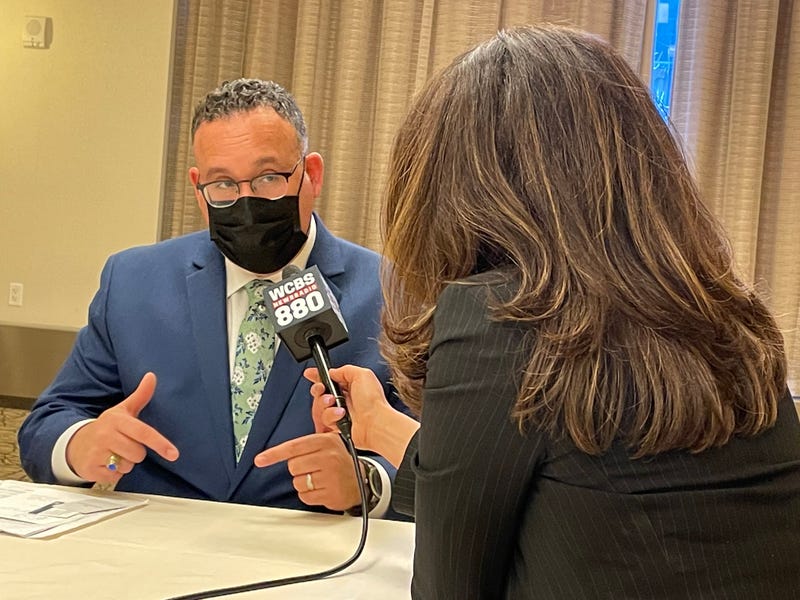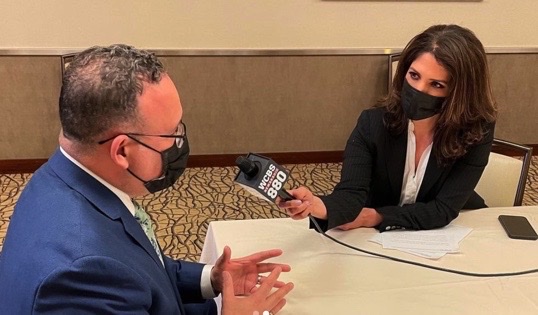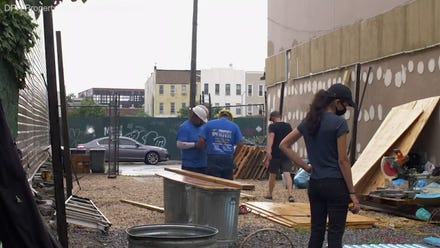-
Small Business Spotlight: Pandemic Uncertainty Fuels Suburban Housing Shortage
Post Views: 885By Joe Connolly and Neil A. Carousso
WCBS 880 (NEW YORK) — The housing market has flipped upside down.
As people grow accustomed to new living habits, their housing needs have changed.
Alison Bernstein, founder of The Suburban Jungle Group, owns proprietary software that helps families develop a “home search strategy,” focusing on the neighborhood rather than the housing transaction.
“I think this whole pandemic and the way that we live and the way that we look at life has really shown that thinking about, objectively, all of your options is transforming the way you purchase real estate,” Bernstein said on the WCBS Small Business Spotlight, sponsored by Dime Community Bank.
She started the company in 2004 shortly after having her first child when she was considering moving out of the city to New York’s suburbs to raise her family.
In her home search, she realized there are three bedroom homes everywhere, but only one neighborhood that best suits each family.
“You want to understand, specifically, the community before you get into the home purchase,” said Bernstein.
Her employees are trained to be objective advisors to find the right community fit for each family depending on their lifestyle. For example, The Suburban Jungle Group would recommend a town on Long Island with Little League teams for a family with a young boy who’s interested in baseball. They partner with local agents to make the home purchase.
People are resetting their priorities and Bernstein believes they’re catching onto the flexibility of remote work, which has enabled The Suburban Jungle Group to grow, attract and retain talent, and expand nationally. They recently opened offices in Denver, Philadelphia and South Florida.
“The other piece of it is never having a written out business plan because I always explain to people that your business changes every day and I think where some of these businesses really got stuck when the world changed so quickly (is) they kept going back to this plan,” she said, adding, “You have to be quick and nimble.”
Bernstein told WCBS 880’s Joe Connolly and Neil A. Carousso the housing market is in a bit of a “holding pattern” right now because people are unsure if they will return to the office five days a week, work on a hybrid schedule or stay fully remote as the COVID-19 pandemic extends past a year.
“Right now, all across the board, specifically in the New York market, we’re facing an inventory issue outside of the city and a lot of that has really been driven by sort of the weirdness of the dynamic,” she explained. “This back to work is a big question. There are so many thoughts on what that’s going to look like and nobody really knows and that’s going to be a key determinant in terms of what’s happening in the market.”
The real estate veteran said there’s a lack of housing inventory in the suburbs nationwide, noting people used to live close to where they work, but commuting distance may be outdated for some workers in the post-pandemic economy.
“The home has been completely redefined,” Bernstein said. “Not only is it a place where you sleep, but now, you’re working, you’re schooling, you’re shopping, you’re eating, you’re exercising, so everything about the home is different. And so, now people’s take on home and where they want to be is also very different.”
See the new trends in the real estate market as people’s living habits and needs have changed on the WCBS Small Business Spotlight video above.
-
Education Secretary on getting kids back in school: ‘We need to go 5 days as quickly as possible’
Post Views: 884By Lynda Lopez, WCBS Newsradio 880
NEW YORK (WCBS 880) — Recently-confirmed U.S Education Secretary Miguel Cardona made his second visit to the Tri-State area this week.
The former Connecticut public school teacher and education commissioner met with New York City Schools Chancellor Meisha Ross Porter ahead of her announcement Thursday to increase the threshold for COVID-related school closures.
Under new guidance, the city’s public schools will close for 10 days when there are four or more new COVID-19 cases within a week, rather than just two cases.
Cardona told anchor Lynda Lopez for the 880 Weekly Rewind that New York City public schools have a smart strategy to begin to address the learning loss that has happened at disproportionate rates in communities of color.
“The impact of the pandemic for our Black and Brown students or students with disabilities has been significant so we have to make sure that as we’re thinking about reopening, we pay particular attention to how to help those students regain whatever was lost and really make sure that when they come back they’re coming back to a system that looks different than what it did before,” Cardona said. “It’s a very low bar if we say we want to go back to how school was before. So we have to set the bar higher and we have to make sure that the programming that we have… are aimed at those students who the pandemic affected most. We have to be very intentional about that, we have to be unapologetic about that, and we have to be bold to say some communities were hurt more than others. We have to make sure we’re taking care of those communities.”
Cardona said it is a priority to get as many students back in classrooms full-time as soon as possible and as safely as possible, but he cautions that it’s not a one-size-fit-all approach across the nation as COVID-19 cases and hospitalizations rise in the northeast and upper Midwest.
“We need to have a level of urgency like we’ve never had to get students in five days a week, but as you know one size does not fit all,” Cardona said. “Not all schools are the same in terms of safety, in terms of ventilation, or not all communities feel as comfortable, or are as vaccinated, and the COVID rates obviously have a lot to do with their level of comfort.”
For Cardona, the key is maintaining mitigation strategies, such as mask wearing, to clear a path for reopening schools.
INTERVIEW: @SecCardona talks #NYC schools, challenges of COVID, and getting kids back in the classroom.
— WCBS 880 (@wcbs880) April 9, 2021
"We need to go five days as quickly as possible. Our kids deserve it. They're waiting for us. We need to to act," he tells @LyndaLopez08.
Listen: https://t.co/jQySDZKwyJ pic.twitter.com/YeDr1KVMRh“I see across the country people getting a little comfortable taking off their masks. That’s going to lead to school closings,” he said. “We need to make sure we’re following those mitigation strategies and in schools we need to make sure we’re communicating with all stakeholders so that everybody’s on the same page. Every day that passes is a wasted opportunity for a student to engage with a friend, with a teacher and learn. So we need to have a high level of urgency and we cannot be satisfied with two days a week, that’s not enough. We need to go five days as quickly as possible. Our kids deserve it. They’re waiting for us. We need to to act.”
As schools focus on reopening, Cardona sees this moment as an opportunity to hit the reset button on a slew of issues that he hopes will fix the education system.
“There’s tremendous opportunity here,” Cardona said. “Yes, we are coming back from something that created trauma for everyone, and we have to heal together, but we’re going to learn, and we’re going to grow together and we have an opportunity to really move education in a direction that it hasn’t moved and at a pace that it hasn’t moved in the past. Our students deserve it, they’ve been sitting at home, many of them, for a whole year, and it’s really, for me, an opportunity to lead at a time when our country needed it most.”

U.S. Eduction Secretary Miguel Cardona with WCBS 880 anchor Lynda Lopez. Photo credit: Peter Haskell. Achievement disparities and improving pathways to career options are among the issues he’d like to address.
“My role as commissioner of education in Connecticut over this past year really cemented a strategy that I think is necessary in order for our kids to achieve their potential and that is working together with colleagues, different stakeholders, making sure that we have people’s different voices at the table early so it’s a shared purpose and a shared strategy to improve the outcomes for all students,” Cardona said. “During the pandemic, we were forced to problem solve together, and we didn’t always agree with all the stakeholders that were around the table, but we listened to different perspectives.”
Cardona said as the country comes out of the pandemic it’s important to run with that collaboraticve strategy to build better opportunities for all students.
A $130 billion investment in the American Rescue Plan to invest in schools and the long-term recovery process will go a long way in improving the country’s education system, beyond just turning on the lights, buying new filters and purchasing face masks, Cardona said.
“It means making sure that our schools are equipped with social, emotional supports that our students and staff are going to need for the next several years, it’s ensuring that we have wraparound services, it’s ensuring that we have good summer learning opportunities for students,” Cardona said. “It’s about giving them rich experiences with relationships so that students can grow and really reengage in schools. We have to heal together and again the American Rescue Plan provides funds for, not only making sure schools are safe, but making sure that the schools that we prepare for our students in the future are better than the schools that they left last March.”
https://omny.fm/shows/880-weekly-rewind/digging-into-the-ny-budget-covid-travel-and-our-siHear comprehensive analysis of the top stories of the week and original reporting on The 880 Weekly Rewind hosted by Lynda Lopez Friday nights at 7 PM on WCBS-AM New York. Listen to this week’s full show, produced by Neil A. Carousso, on the media player above.
-
Small Business Spotlight: Brooklyn Entrepreneur Scales Property Maintenance Business to New Heights
Post Views: 982By Joe Connolly and Neil A. Carousso
NEW YORK (WCBS 880) — This entrepreneur is coming into his own.
Anthony Finkel grew up in Ditmas Park, Brooklyn where he developed an appointment-based snow removal service in 2013. He cleaned up, literally.
“That first snowfall, I got a bunch of phone calls. They called us again that next time, and when that first winter was up, they started asking us, ‘Hey, can you paint my porch, can you clean out my garage, can you fix my deck?'” he told Joe Connolly and Neil A. Carousso on the WCBS Small Business Spotlight, sponsored by Dime Community Bank.
Finkel met their needs and expanded his offerings at DPH Property Maintenance Service. When the pandemic hit, demand surged.
U.S. home improvement projects and repairs grew more than 3 percent last year to nearly $420 billion, according to a report from Harvard University’s Joint Center for Housing Studies.
Finkel reaped the benefits, telling WCBS 880 demand has remained high over the past year and it’s picking up this spring.
“They’re home, they’re not going to the office as much, and now, they’re converting that extra room that might have had clutter in it,” he explained. “Now, they want to clean it out, they want to re-paint it and they want to turn it into their home office or their studio space.”
People are investing in their homes and personal space while many companies look to implement hybrid work schedules when they can bring workers back to the office with COVID-19 safety measures in place. Some employees may never return to the office.
Finkel is renovating corporate spaces, too. He says it’s a “mixed bag” among his clients who plan to work from home long-term and those who will go back to their office.
He had six employees pre-pandemic and has hired four more to keep up with rising demand. He hopes to double the number of workers in the next 12 months if he can double subscriptions to his home and garbage clean-up service from 50 city dwellers to 100.
“When you understand the scope of the work that you’re doing and the quality, and you’re able to bring high quality, it makes it a little bit easier to stand by your pricing and stand by your ask because you know what you’re going to bring to the table, Finkel said. “When people hire DPH, they’re getting dependability, reliability, high quality service and no-nonsense.”
He told Connolly and Carousso customer service and quality has been the key for DPH Property Maintenance Service’s growth not volume, emphasizing research as the foundation of his home improvement work.
“It’s not about how fast, but it’s how precise,” Finkel explained. “You don’t want to have to go back and re-fix things that you thought were done before.”
See how this small business is scaling quickly and meeting demand on the WCBS Small Business Spotlight video above.
-
NJ Veterans Group Rebuilds Sandy-Destroyed Housing as Homelessness Crisis Worsens in Pandemic
Post Views: 927By Neil A. Carousso
NEW JERSEY (WCBS 880) — It’s been nearly a decade since Superstorm Sandy rocked the Tri-State, but a veterans organization is still trying to rebuild while the COVID-19 pandemic compounds the homelessness issue at the heart of its mission.
There are nearly 600 homeless veterans in New Jersey – a jump of 7.99 percent from 2019 to 2020, according to the U.S. Housing and Urban Development’s Annual Homelessness Assessment Report.
The American Legion Post 107 is hoping to reduce the number of homeless vets in Hudson County, estimated to be 70, by about a third next year when it anticipates phase II of its post-Sandy rebuild will be complete.
“Our objective is to take homeless veterans off the street,” said Post 107 Commander John Carey.
Phase I of rebuilding the Veterans Center of Hoboken took six veterans off the streets into fully-furnished apartments. Phase II will add 18 studios and six single-bedroom apartments to house 24 of our nation’s heroes. The organization hopes to break ground this summer for completion next year.
“Our apartments are furnished from everything from a toothbrush to a microwave oven,” said Carey who stressed this as the differentiating factor between the Veterans Center of Hoboken and other grassroots organizations that provide shelter for veterans – sometimes without even a mattress.
“These men, like myself, we served our country and for whatever reason they have a major problem right now, we need to service that problem,” said Carey who was drafted by the U.S. Army in 1965 and served two years in Thailand and Vietnam.
The Post Commander described his service as the “FedEx for Vietnam,” telling WCBS 880’s Neil A. Carousso, “We delivered everything from a bullet to a plane to Vietnam.”
Today, Carey is leading the non-profit effort to support his peers. It’s heartbreaking for him to walk by homeless vets on nearly every bench he passes along the Hudson River.
“The word homeless should never be used with the word veteran,” he emphasized.
The Veterans Center of Hoboken has provided meals, clothes and emotional support, virtually, during the pandemic.
“They’re out of the shelters because they can’t crowd in the shelters so they’re really all over the place,” Commander Carey explained. “We bring them food, clothing, we have a veterans closet where we bring them clothes.”
Carey told WCBS 880 he believes mental illness is at the root cause of the veterans homelessness issue and housing is a step for healing their wounds and providing dignity for those who bravely served the country.
“We will have an office there where we’re going to work with the VA. They’re going to have a counseling person there every day,” he said.
American Legion Post 107 has raised about $2 million from the community for the project.
They need roughly $3.75 million more to put Phase II over the finish line in the next 18 months. You can read more about the project and donate here.
-
Watch: Mayoral Candidate Maya Wiley Reveals Plans for NYC’s Recovery
Post Views: 931By Lynda Lopez, WCBS Newsradio 880
NEW YORK (WCBS 880) — In about two months, New Yorkers will vote in the mayoral primaries to pick a new leader who will come in facing pressing issues including overseeing the city’s recovery from the pandemic.
More than two dozen men and women are running to replace the outgoing Mayor Bill de Blasio, including his former counsel Maya Wiley.
Wiley, an attorney and civil rights activist, chaired the city’s Civilian Complaint Review Board after working at City Hall.
She also worked as a legal analyst on MSNBC before announcing her run for mayor last October.
Anchor Lynda Lopez spoke with Wiley for Friday’s installment of the 880 Weekly Rewind and asked how she plans to help the city recover and what she plans to focus on, not just to shepherd the city out of the devastated economy, but to make it work going forward.
“We had an affordability crisis before COVID hit. We have been struggling, frankly, with racial issues and racial injustice for generations, actually, but coming to a head as we saw this summer,” Wiley said. “We’ve had this kind of spiritual exhaustion because of the division, because of the struggle of daily life, and then COVID hits and now we’re traumatized and our economy is in tatters. We have 400,000 people facing eviction. We have over 200 million going hungry. This is a crisis of historic proportion, but as the candidate in this race that has also been in that hot kitchen we call City Hall, I also know that we have resources that we can use in order to not just meet the needs of our people right now, but start to solve some of our affordability issues.”
One of her proposals, New Deal New York, would create 100,000 new jobs by spending $10 billion of the capital construction budget to build affordable housing.
Another proposal would focus on investing in child and elderly care.
“The cost of child care and elder care is one of the top three expenses in the city before COVID, but what we’re going to do is put $,5000 a year into the pockets of, starting with 100,000 of our neediest families, to care for children and elderly adults, but we’re also going to create community care centers,” Wiley said.
Lopez also asked Wiley what she would do as mayor to improve the city’s schools and equity in education.
Educational equity was brought to the forefront when it became clear Black and Brown students were disproportionately impacted by the pandemic shutdown.
Minority students were at a disadvantage when it came to remote work.
Many families in underserved communities lacked the digital tools and resources to thrive in the virtual learning environment.
Wiley said every students deserves an exceptional education and that means ensuring that more dollars are getting into the classroom and to help kids who are struggling to get online.
“Something I’ve done inside City Hall is show city government how to do free broadband, getting every single apartment in Queensbridge Houses free service that the city paid for. I did that as counsel to the mayor, I know how to get it done, but we have to do that now because we don’t develop the educational opportunities for our kids if we’re not solving that digital divide,” Wiley said. “That is critically important.”
Wiley also said it’s time to stop policies that discriminate against children.
“We should not be using any admission standards that aren’t really about what kids need but are rather about what families have the resources to pay for the tutoring that gets them over the hump on a test,” Wiley said. “First of all, families shouldn’t have to do that and far too many of our families don’t have the resources to do it and it’s not meeting an educational agenda.”
She also proposes cutting some of the bureaucracy that’s coming out of the Department of Education to open the door for principals and teachers to bring more innovation to the table.
“There is a lot of it in our system, but it gets strangled by some of these rules rather than really thinking about what serves the need of our students particularly at a time when we have so much to do to help them come back,” Wiley.
https://omny.fm/shows/880-weekly-rewind/reopening-and-covid-concerns-maya-wileyHear comprehensive analysis of the top stories of the week and original reporting on The 880 Weekly Rewind hosted by Lynda Lopez Friday nights at 7 PM on WCBS-AM New York. Listen to this week’s full show, produced by Neil A. Carousso, on the media player above.












